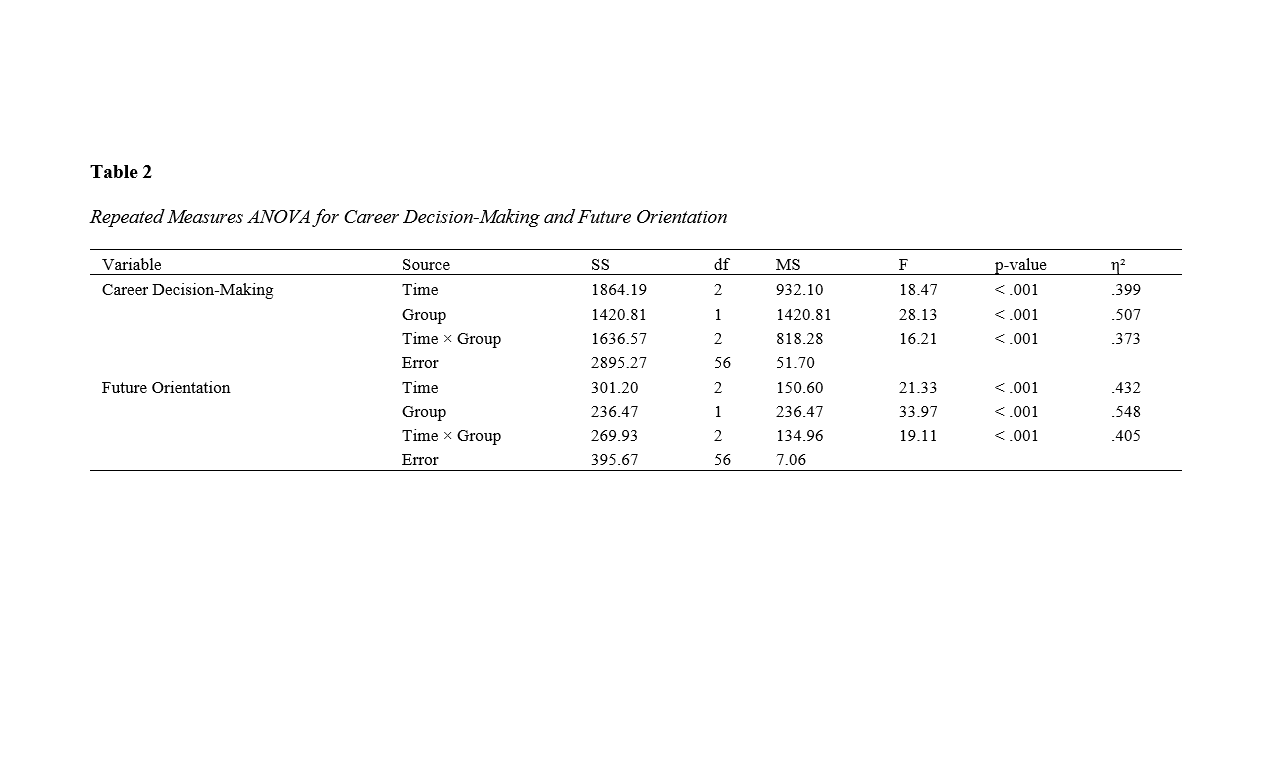Evaluating the Effectiveness of Positive Career Counseling on Career Decision-Making and Future Orientation
Keywords:
Positive Career Counseling, Career Decision-Making, Future Orientation, Randomized Controlled Trial, Young Adults, TaiwanAbstract
Objective: This study aimed to evaluate the effectiveness of Positive Career Counseling on career decision-making and future orientation among young adults in Taiwan.
Methods and Materials: The study utilized a randomized controlled trial design involving 30 participants from Taiwan, randomly assigned to an experimental group (n = 15) receiving Positive Career Counseling and a control group (n = 15) receiving no intervention. The experimental group participated in nine structured counseling sessions, each lasting 75 to 90 minutes, incorporating strengths-based and future-oriented exercises. Participants completed standardized measures, including the Career Decision-Making Difficulties Questionnaire (CDDQ) and Future Orientation Scale (FOS), at three time points: pre-test, post-test, and a five-month follow-up. Data were analyzed using repeated measures ANOVA and Bonferroni post-hoc tests with SPSS-27.
Findings: Results indicated significant improvements in career decision-making and future orientation within the experimental group. Repeated measures ANOVA demonstrated significant time × group interactions for career decision-making (F(2,56) = 16.21, p < .001, η² = .373) and future orientation (F(2,56) = 19.11, p < .001, η² = .405). Bonferroni post-hoc analyses showed meaningful enhancements from pre-test to post-test for both variables (career decision-making mean difference = -14.40, p < .001; future orientation mean difference = -5.73, p < .001). Improvements were sustained at the five-month follow-up, while the control group exhibited no significant changes.
Conclusion: These results support the effectiveness of integrating positive psychology and structured future-oriented exercises into career interventions, emphasizing their potential for long-term impact. Such interventions should be adapted for broader populations to enhance career preparedness and psychological resilience in culturally diverse contexts.
Downloads
References
Argyro, C. K. (2019). Career Decision-Making Self-Efficacy on Mathematics and Science: A Literature Review. Psychology and Psychotherapy Research Study, 3(1). https://doi.org/10.31031/pprs.2019.03.000556
Bi, Y., Mou, S., Wang, G., & Liao, M. (2023). The relationship between professional self-concept and career decision-making difficulties among postgraduate nursing students in China: the mediating role of career decision-making self-efficacy. Frontiers in psychology, 14, 1198974. https://doi.org/10.3389/fpsyg.2023.1198974
Cardoso, P., Gonçalves, M. M., Mendes, I., Sousa, I., Taveira, M. d. C., & Silva, F. (2023). Eliciting Reconceptualization Innovative Moments to Foster Change in Career Construction Counseling. The Career Development Quarterly, 71(1), 2-14. https://doi.org/10.1002/cdq.12316
Demirtaş-Zorbaz, S., Korkut-Owen, F., Arıcı-Şahin, F., & Mutlu, T. (2023). Career sailboat: A model for enhancing career decision-making self-efficacy among job-seekers. British Journal of Guidance & Counseling. https://doi.org/10.1080/03069885.2023.2177615
Fatimah, S., Suherman, M. M., & Rohaeti, E. E. (2019). Pelatihan Penerapan Metode Plans Untuk Mengembangkan Efikasi Diri Dalam Pengambilan Keputusan Karier Siswa Di Kabupaten Purwakarta. Jurnal Bimbingan Dan Konseling Islam, 9(2), 121-130. https://doi.org/10.29080/jbki.2019.9.2.121-130
He, Z., Zhou, Y., Li, F., Rao, Z., & Yang, Y. (2021). The Effect of Proactive Personality on College Students’ Career Decision-Making Difficulties: Moderating and Mediating Effects. Journal of Adult Development, 28(2), 116-125. https://doi.org/10.1007/s10804-020-09359-9
Islam, T., Ahmed, I., Usman, A., & Ali, M. (2021). Abusive supervision and knowledge hiding: the moderating roles of future orientation and Islamic work ethics. Management Research Review, 44(12), 1565-1582.
Li, Y., Mitts, N. G., & Whiston, S. C. (2019). Chinese International Students’ Expectations About Career Counseling. Journal of Career Development, 48(1), 73-88. https://doi.org/10.1177/0894845319832672
Maree, J. G. (2022). Enhancing Group Self- And Career Construction Counselling: A Review of Outcome Research. Cypriot Journal of Educational Sciences, 17(5), 07-28. https://doi.org/10.18844/cjes.v17i5.6667
Miconi, D., Geenen, G., Frounfelker, R. L., Levinsson, A., & Rousseau, C. (2022). Meaning in Life, Future Orientation and Support for Violent Radicalization Among Canadian College Students During the COVID-19 Pandemic. Frontiers in Psychiatry, 13. https://doi.org/10.3389/fpsyt.2022.765908
Milot‐Lapointe, F., & Arifoulline, N. (2025). A Meta‐Analysis of the Effectiveness of Individual Career Counseling on Career and Mental Health Outcomes. Journal of employment counseling, 62(1), 49-57. https://doi.org/10.1002/joec.12239
Najam, B., & Ghazal, S. (2022). A Qualitative Exploration of the Outcome Expectations in Determining Career Choices of College Students. Pakistan Journal of Humanities and Social Sciences, 10(1). https://doi.org/10.52131/pjhss.2022.1001.0183
Previarzya, R. S., & Asmarany, A. I. (2023). The relationship of self-efficacy and career decision-making in the 12th grade high school student. American Journal of Multidisciplinary Research & Development (AJMRD), 5(6), 118-122.
Sangadah, M., Isriyah, M., & Rahmawati, W. K. (2025). Empowering Career Choices: Developing Social and Emotional Support Services for Adolescents. Jurnal Bimbingan dan Konseling Terapan, 9(1), 101-112. https://doi.org/10.30598/bkt.v9i1.17113
Silva, F., Taveira, M. d. C., Cardoso, P., Ribeiro, E., & Savickas, M. L. (2022). Therapeutic Collaboration in Career Construction Counseling: Case Studies of an Integrative Model. Frontiers in psychology, 12. https://doi.org/10.3389/fpsyg.2021.784854
Sun, M. J., & Yoo, N. (2023). A Qualitative Case Study on Career Construction Counseling for Highly Educated Women With Career Interruption. Korean Association for Learner-Centered Curriculum and Instruction, 23(9), 781-802. https://doi.org/10.22251/jlcci.2023.23.9.781
Szilagyi, A. (2022). The Benefits of Group Counseling in Career and Educational Settings. Online Group Work as an Alternative Intervention in a Post-Pandemic World. Journal of Educational Sciences & Psychology, 12 (74)(2), 114-121. https://doi.org/10.51865/jesp.2022.2.13
Wahyuningsih, D., Wibowo, M., Purwanto, E., & Mulawarman, M. (2023). Career decision-making self-efficacy and its implications in high school students during the Covid-19 pandemic. Health Education and Health Promotion, 11(1), 153-158.
Wang, D., Li, Y., & Wang, G. (2024). A Systematic Review on Career Interventions for High School Students. Frontiers in psychology, 15. https://doi.org/10.3389/fpsyg.2024.1461503
Yanxia, G. (2023). Gender Differences in Career Counseling:Influencing Factors and Coping Strategies. Academic Journal of Humanities & Social Sciences, 6(18). https://doi.org/10.25236/ajhss.2023.061822

Downloads
Additional Files
Published
Submitted
Revised
Accepted
Issue
Section
License

This work is licensed under a Creative Commons Attribution-NonCommercial 4.0 International License.








